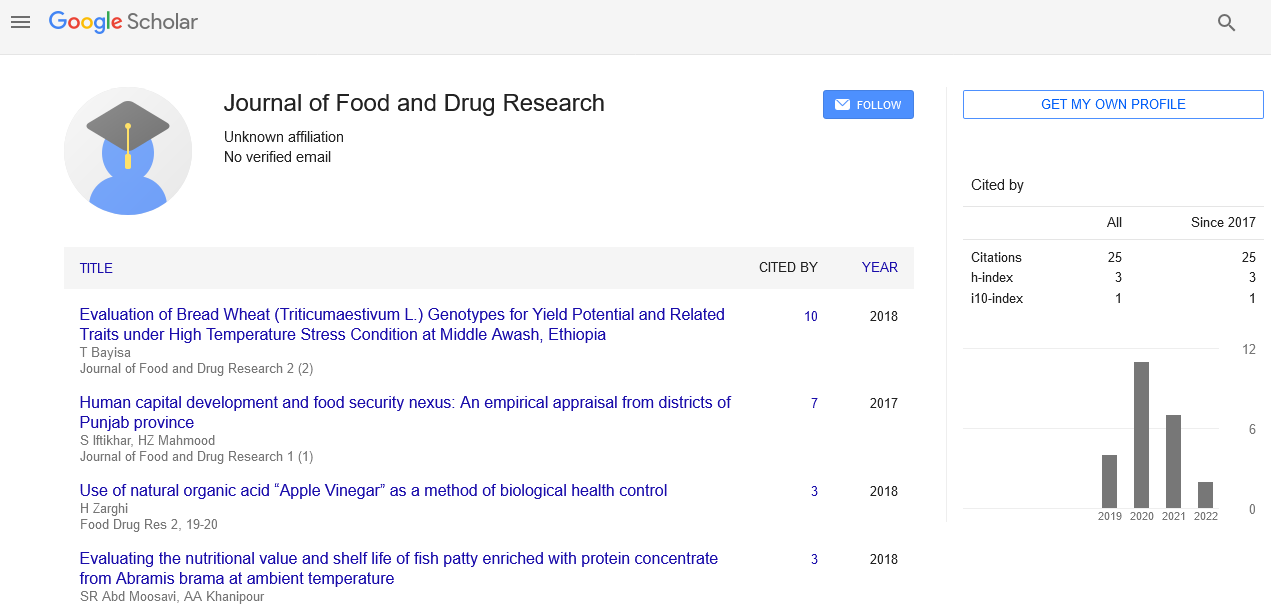Effects of drugs on food and nutrition
Received: 05-Nov-2021 Accepted Date: Nov 19, 2021; Published: 26-Nov-2021
This open-access article is distributed under the terms of the Creative Commons Attribution Non-Commercial License (CC BY-NC) (http://creativecommons.org/licenses/by-nc/4.0/), which permits reuse, distribution and reproduction of the article, provided that the original work is properly cited and the reuse is restricted to noncommercial purposes. For commercial reuse, contact reprints@pulsus.com
Commentary
Nutrition can affect the body’s response to drugs on the contrary, drugs can affect the body’s nutrients. Diet can improve, slow down, or reduce drug absorption. Food interferes with the absorption of many antibiotics. They can alter drug metabolism examples include high-protein foods that can speed up the metabolism of certain drugs by stimulating cytochrome P-450. Eating grapefruit can inhibit cytochrome P-450 34A, reducing the body of other drugs (amiodarone, carbamazepine, cyclosporine, calcium channel blockers). Foods that alter a bacterial plant can significantly affect the digestion of certain drugs. Some foods contribute to the body’s response to drugs. For example, tyramine a component of cheese and a potent vasoconstrictor, can cause hypertensive problems in some patients who take monoamine oxidase inhibitors and consume cheese.
Malnutrition can affect drug absorption and metabolism. Severe deficiency of protein reduces the concentration of enzyme tissue and may impair drug response by reducing the absorption or binding of proteins and causing liver dysfunction. Changes in the gastrointestinal tract can disrupt absorption and affect the response of the drug. Lack of calcium, magnesium, or zinc may be detrimental to the body of the drug. Vitamin C deficiency reduces the activity of digestive enzymes, especially in the elderly. Many drugs affect appetite, food intake, and body tissues (see table). Some drugs like metoclopramide increase bowel movements, reducing food absorption. Some drugs like opioids, anticholinergics etc... Reduce bowel movements. Some medicines are better tolerated when taken with food but certain drugs affect the absorption of vitamins or the body
The complex interactions between diet, nutrients, and drugs make it difficult to determine the effects of interactions in the body. A medicine is defined as something used to diagnose, treat, or prevent a disease, or part of a medicine. There are many amazing side effects and problems that can be caused by drug interactions with food, drugs, and alcohol and alcohol, and this varies from person to person. Drug interactions involving nutrient changes in gene expression, or changes in structure due to a drug. Digestive drug interactions are a broad term that describes the effects of a drug on nutritional status. Each of these interactions can cause many problems.
Some medicines can change appetite by disrupting taste or smell can cause nausea or vomiting abd may also cause sores in the mouth Decreased appetite - Drugs such as amphetamine prescribed for dysfunctional children, help fight a child’s behaviour but can lead to loss of appetite, change taste. sensitivity and nausea. Increased appetite - Antihistamines or certain psychotropic drugs cause a significant increase in appetite and therefore weight gain. Cancer patients or AIDS patients with anorexia are given medications that can increase appetite, which is why they increase their diet and weight. But just taking energy may not restore the body’s weight in these patients.
There are many factors that can contribute to a healthy diet. Food availability, body strength, appetite, the presence of intestinal symptoms and anorexia are examples. Drug treatment can have a detrimental effect on healthy play as a result of these factors, especially due to side effects.
Acknowledgements
None
Conflicts of Interest
None






